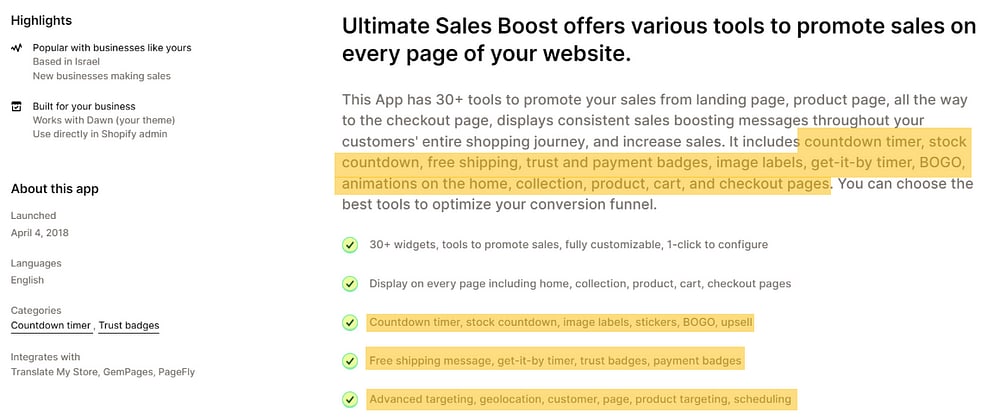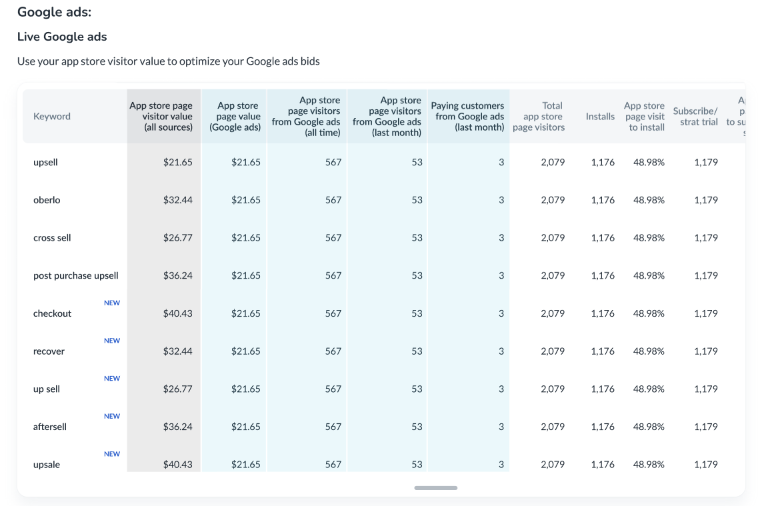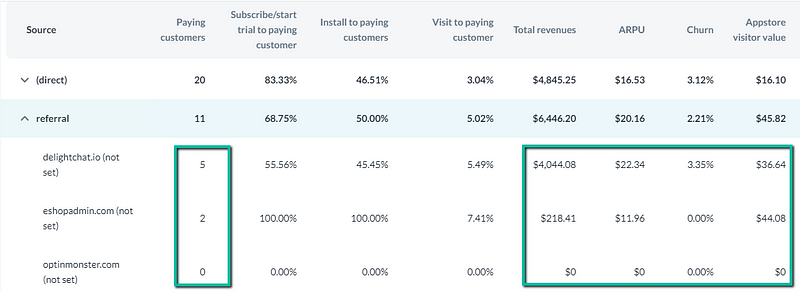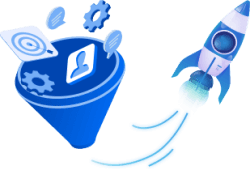How to grow your Shopify app to $100K MRR and beyond

Your Shopify app store page is at the top of your conversion funnel. The more merchants you feed into it, the more new customers you‘ll get.
If you grow your app store page’s traffic you’ll raise your new customer growth rate and scale your app.
To double your app store page traffic you need to:
By implementing these tactics, you can scale your Shopify app store page traffic and customers aggressively.
It’s easy to start getting low-quality visitors when you try to expand your traffic aggressively. To maintain traffic quality, it’s vital to know the most valuable traffic sources and keywords for your app.
Knowing which traffic sources are most valuable will help you focus on expanding the right marketing and business development campaigns. Does your blog lead to actual revenues? Which partners send traffic that leads to significant revenues?
For search-based sources such as organic and performance marketing, it’s imperative to know keyword performance. By identifying your top-performing keywords, you can strategically integrate them into your app store page listing, driving organic traffic. Additionally, you can leverage paid traffic from Shopify and Google ads to expand your reach and maximize your results.
But which keywords should you focus on? You want the most valuable keywords for your app: popular search terms that convert well for your app, result in significant revenues, and that are not too competitive.
Prys is a new Shopify app growth platform that lets you check value, revenues, and paying customers for each keyword. You get immediate suggestions on both organic and paid keywords for free.


The placement of an app store page in the Shopify app store organic search results is influenced by various factors, including the relevance of the app’s title, description, and keywords to the user’s search query, the number and quality of user reviews and ratings – particularly recent ones, the app’s download and installation rates, the frequency of updates and improvements, and the overall engagement and user experience provided by the app.
You can easily boost your organic traffic for relevant search terms by placing strategic keywords in your app store page listing and related places. The more prominently you place a keyword, the higher you’ll rank for that term in Shopify’s organic app store search results, and the more traffic you’ll get for it.
There are only so many prominent places to insert keywords in your app store listing. It’s critical to prioritize. You want to focus on the most valuable keywords for your app.
You can use Prys to find the most valuable organic keywords to focus on.

Once you have a prioritized list of keywords, you can place them strategically, growing the organic traffic you get from related searches.

5. Your app store page URL is another place you can add a keyword after your apps name. For example https://apps.shopify.com/avada-email-marketing
6. App introduction is the prominent copy section below your video. You get 100 characters, 20–25 words, to introduce your app. That gives you enough room to work in several top keywords alongside your value proposition.

7. Use your general copy and bullets to work in your top keywords. Some repetition is ok.

If you’re just starting with ads, test your top 5–10 keywords in Shopify and Google ads. Over time, fine-tune and expand your keywords and bids at positive ROI: value per visitor> Cost per click.
You can use Prys to get suggestions on paid keywords to focus on, including the value per visitor for each keyword from each platform. Your value per visitor tells you what is the maximum cost per click to be profitable.

Google ads monitoring — Prys
Once your Shopify and Google ads are in a stable place, copy your Google campaign to Bing. After Bing, you can test other performance marketing platforms such as LinkedIn, Facebook, Reddit, Pinterest, Youtube, Instagram, Tiktok, and Twitter.
M1: Launch Shopify and Google ads for your top 5–15 keywords
M2: Check ROI, tune campaigns & add 5–15 keywords
M3: Tune campaigns & add 5–15 keywords
M4: Tune campaigns, launch Bing
M5: Tune campaigns, expand Bing
M6+: Tune & expand Shopify, Google and Bing campaigns. Add, test, optimize, and expand other platforms: Facebook, LinkedIn, TikTok, Instagram etc.
If you plan to run Google ads, having a landing page is a necessity. For certain search terms, Google may only allow you to run ads that don’t lead directly to the Shopify domain. This restriction excludes using your Shopify app store listing as the destination for users clicking on the ads.
Your landing page’s header should prominently feature your app’s value proposition, highlighting its affiliation with Shopify. Include a product image, references to Shopify reviews and satisfied customers, and a clear call to action inviting users to start a free trial.
Below the header, showcase your app’s key features, pricing details, user testimonials, social proof, and address frequently asked questions. If your landing page is lengthy, reiterate your value proposition and calls to action strategically.
The call-to-action buttons on your landing page can send visitors to your app store page, where they can install your app by clicking “add app.” However, this induces an additional step (landing page to app store page to add app click), which may reduce your conversion rate. To streamline the process and avoid the extra click, you can provide merchants with a direct installation link bypassing the app store page.
Some of the quality traffic most apps get comes from sources other than search-related. Some sources, such as direct visits, are pretty impossible to expand. Others can be developed.
It’s critical to check each of your sources, including in detail, to see what works. Referrals are a good example. If you’ve accumulated some referral partners over time, knowing which partners lead to actual revenues tells you which relationships to nurture, expand, and try to replicate.

Use these tactics to grow your top-of-funnel traffic and scale your app.
Implementing these strategies can help you grow your Shopify app store page traffic and scale aggressively in 2024.
How to grow your Shopify app to $100K MRR and beyond
Fix Your Shopify App’s Conversion Funnel To 3x Your Growth Rate
Shopify app funnel optimization part 1: Shopify app store page to Shopify app install.
Since 2018, we’ve been helping Shopify apps achieve exceptional growth.
Our team at Convert2x offers a comprehensive solution to scale your Shopify app:
– Grow organic and paid traffic
– Optimize your Shopify funnel
– Maximize monetization
Convert2x was founded by Boaz Lantsman, a repeat entrepreneur and conversion rate optimization expert. Since our inception, we have focused on Shopify apps, perfecting every aspect of scaling: from SEO and paid traffic acquisition through end-to-end funnel optimization that maximizes monetization.
Before founding Convert2x, Boaz led marketing at a B2B SaaS startup, where his strategies multiplied the conversion rate by 16x and increased sales by 7x, leading to the company’s acquisition by DocuSign for nearly $100 million. Following this success, Boaz co-founded RoutePerfect, a travel startup where he achieved a 12x increase in conversion rate and scaled the platform to 5 million users and $500K MRR.
In addition to his work at Convert2x, Boaz co-founded Prys, a breakthrough Shopify app growth platform (https://www.prys.io). Prys provides end-to-end attribution, showing which search terms and campaigns drive your revenues, and offering actionable insights to scale your Shopify app.
At Convert2x, we apply Boaz’s proven methodologies and our team’s extensive expertise to help Shopify apps thrive. Join us, and let’s grow your app to new heights.
































We help Shopify apps find and prioritize keywords, scale traffic with SEO and paid ads, maximize monetization, and optimize the Shopify app store page and post-install funnel.
I’ve worked with many consultants before, who are just in it to sign another client and make another dollar. Boaz is far from that type of person. There haven’t been many people in my career who I’ve worked with that “get it” quite like Boaz. He uses a data-driven approach and industry knowledge to provide strategies that work. He helped us optimize some areas of our business better than I could have imagined. I thought some of the projections he proposed to us were impossible, but we’ve actually outperformed these and are still on our way up. I couldn’t recommend Boaz more (unless you are a competitor, in which case he sucks…)